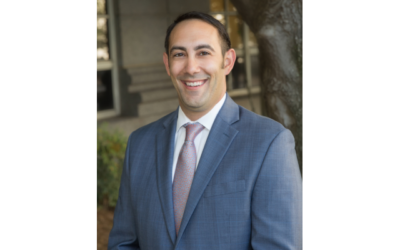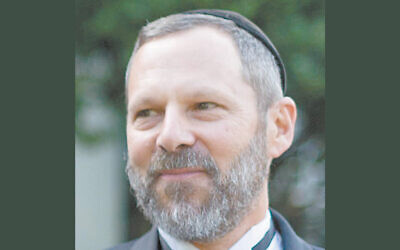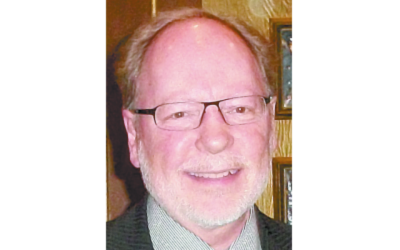Jews a Tiny Fraction of Georgia Legislature
A former House member says that the number of Jews is less important than the number of legislators who support Jewish values.
Dave Schechter is a veteran journalist whose career includes writing and producing reports from Israel and elsewhere in the Middle East.

An Atlanta Jewish Times headline in January 2016 read “Ga. Legislature Lacks a Minyan.” At the time, there were two Jewish state legislators: Sen. Renee Unterman, R-Buford, and Rep. Michele Henson, D-Stone Mountain.
When the legislature reconvenes in January, neither will be present. Unterman relinquished her seat in an unsuccessful try for the Republican nomination in the 7th Congressional District, and Henson’s re-election bid ended in a Democratic runoff loss.

That leaves 79th district Rep. Mike Wilensky, D-Dunwoody, as the only Jewish incumbent currently seeking re-election Nov. 3, opposed by Republican Andrea Johnson. In the challenger ranks, Republican Alex Kaufman is back for a rematch of his unsuccessful 2018 race against now-incumbent state Rep. Josh McLaurin, D-Sandy Springs, in the 51st district.
There are 236 seats in the General Assembly, 180 in the House and 56 in the Senate. An estimated 130,000 Jews make up about 1.2 percent of the population of Georgia. One Jew would make up 0.04 percent of the legislature; two 0.08 percent.

“As we have learned throughout our history, representation matters. As a small minority community and with rising incidents of antisemitism and a need to understand the importance of Israel to the Jewish community, we need to be represented wherever we can, especially in the state legislature, so that decision makers are able to better understand who we are and the issues that are important to us,” said Dov Wilker, regional director of the American Jewish Committee office in Atlanta.
About 240 Jews serve in some 40 state legislatures, representing a larger portion of 5,400 state legislators nationwide than Jews in the general population. There are few in the South. At present, there are none in Alabama, Mississippi, North Carolina, Tennessee and Arkansas; and just one in South Carolina; three in Texas; and about a dozen in Florida, according to Jeff Wice, director of the National Association of Jewish Legislators.
Unterman said that in her 22 years in the General Assembly, serving in both the House and Senate, she could count having had fewer than a dozen Jewish colleagues. “It’s sad because you would think that in almost three decades it would advance more, where more Jewish people would run for office, and I don’t care if they’re Republicans or Democrats,” she said.

Mitchell Kaye, a Republican, represented House District 37 in Cobb County from 1993 to 2003. “To me it is not how many Jews are in the legislature, but how many support Jewish values,” he said. “I found in my 10 years in the legislature, religious Christians of both parties were more supportive of ideas that may be unique to Judaism than many of my co-religionists; how ironic that was.
“Support for a moment of silence in the public schools, as called for many years ago by the [Lubavitch] Rebbe, Rabbi Menachem Mendel Schneerson, the protection of mikvehs when public swimming pool legislation was discussed, as well as strong attendance at ‘lunch ‘n learns’ with a rabbi, are three examples that come to mind.”
Though a Democrat, “Mike Wilensky has done a very good job so far and understands the community,” Kaye said.
The 79th district consists of Dunwoody, part of Doraville, and a small section of Chamblee. Wilensky serves on the House Judiciary Committee, the Intragovernmental Coordination Committee, and the Budget and Fiscal Affairs Oversight Committee. He was active in the successful effort to gain passage of a hate crimes statute in Georgia.

“It is important that our legislature represents the diversity of Georgia’s population, including race, religion, and ethnicity,” Wilensky said. “The Jewish community reflects different views politically and about almost all issues. People of all backgrounds bring different perspectives, due to experiencing life through their own lens, and it is important to have different voices on how our state should move forward,” he said.
“It is important that our leaders focus on helping those who are in the most need: the sick, the elderly, and the young. The Jewish community teaches their children from a young age the strong ethical teaching to love your neighbor as you would love yourself. The Torah states 36 times to love and care for the stranger and the downtrodden. Therefore, we have an important voice to contribute on how to create, adjust, and right society,” he said. In addition, “It is particularly important to have voices at the Capitol who can properly communicate the mutually beneficial relationship between Georgia and Israel.”
An active member of Congregation B’nai Torah, the 37-year-old Wilensky is a graduate of the University of Georgia and the University of Maryland School of Law. In his private legal work, Wilensky specializes in wrongful death and serious injury cases.
He delivered an emotional speech in the House to mark International Holocaust Remembrance Day in January. “My family tree has branches that don’t exist anymore,” Wilensky said in that address. His voice broke as he explained that seven of his great-grandmother’s 10 siblings and 42 of his relatives were murdered in the Holocaust.
Kaufman, a Jewish Sandy Springs native who lives in Roswell, lost to McLaurin 51.6 percent to 48.4 percent in 2018. The 51st District takes in sections of Sandy Springs, Roswell and Johns Creek. The 37-year-old Kaufman, a graduate of the Emory University School of Law, specializes in business litigation at the law firm Fox Rothschild LLP, where he and his father, Robert J. Kaufman, are equity partners.

“Jewish people have been part of the fabric of this country since before its founding through the present. Our people have been on the front lines of fighting for equality for ourselves and others, on building the economy, in the legal field, and in the military. Our culture and religion teach us tikkun olam, personal responsibility to take action, the directive to help others, the value of faith, family and community, as well as the importance of education. I believe that these tenets are messages that we need more of in our leaders at every level of government and regardless of party affiliation,” Kaufman said.
“We have few Jews running for office because we are aware of our relatively small numbers, which are divided even more by party affiliation, and we have historically few elected role models, but we should look for those that have broken barriers. For me, here in Georgia, Attorney General Sam Olens and Judge Debra Bernes proved that openly Jewish candidates can be elected, even statewide,” he said.

Harold Kirtz, president of the Jewish Community Relations Council of Atlanta, said, “Nearly every issue is a Jewish issue. Most issues affect the Jewish community directly, whether it is the educational system, the safety net programs, the public safety system, the economic issues surrounding the availability of and training for jobs, and many other areas, all of which are affected by the impact of the state budget. Many issues are based, in whole or in part, on Jewish values. Welcoming the stranger, taking care of the widow, orphan, and stranger, the do’s and don’ts of the Ten Commandments, the basis of the judicial system, and so many other areas come directly from our tradition. We must lend our voices to the general community to ensure that these values guide the community.”
Jewish voices are important in state legislatures, Wise said, as are non-Jewish legislators who understand Jewish concerns, whether those be anti-Semitism, measures related to the BDS (Boycott, Divestment, Sanctions) movement, not invoking the name of a deity in the invocations that open sessions, or scheduling meetings on the High Holy Days. “We’ve been more active in the last few years to address anti-Semitism, to address [anti-Jewish] violence in the streets, to work on social justice issues, so that within legislatures there’s tolerance for religious observances.”
Georgia legislators are paid $17,341 a year plus $173 in per diem during the 40-day legislative session, which in a normal year (2020 anything but) runs from January to March.
- Alex Kaufman
- Michele Henson
- Mike Wilensky
- Dov Wilker
- Josh McLaurin
- National Association of Jewish Legislators
- Mitchell Kaye
- General Assembly
- Rabbi Menachem Mendel Schneerson
- Judge Debra Bernes
- Jeff Wice
- Dave Schechter
- Voting
- minyan
- Atlanta Jewish Times
- dunwoody
- American Jewish Committee
- Andrea Johnson
- Georgia Legislature
- Alabama
- Mississippi
- North Carolina
- Tennessee
- Arkansas
- South Carolina
- Texas
- Republican
- Democrat
- Florida
- House District 37
- Cobb County
- Lunch 'n Learn
- sam olens
- renee unterman
- politics
- Political
- Georgia Politics
- News
- Opinion
- Community



comments